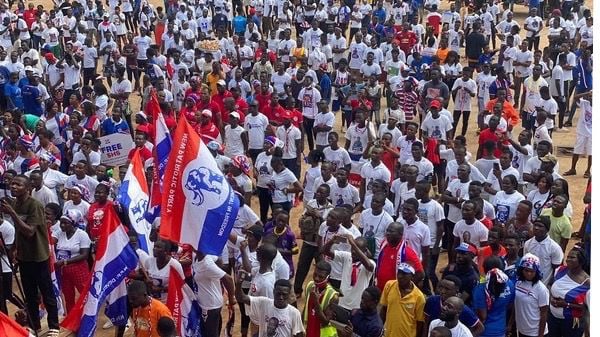The New Patriotic Party (NPP) in Ghana has come under intense criticism for its exorbitant financial requirements for its upcoming presidential primaries, sparking a heated debate about money’s influence in politics and its implications for democracy. Legal scholar and social commentator, Professor Stephen Kwaku Asare, popularly known as Prof Azar, has vehemently condemned the party’s decision to set the nomination fee at GH₵100,000, the filing fee at GH₵500,000, and introduce a controversial “development levy” of GH₵4 million. Prof Azar argues that these steep fees create an insurmountable financial barrier that effectively excludes competent individuals from less privileged backgrounds from contesting for leadership positions, thereby undermining the very foundations of democratic principles. He further criticizes aspirants who remain silent on the issue, accusing them of complicity in perpetuating a corrupt system.
Professor Asare’s critique centers on the argument that such exorbitant fees transform the political landscape into an auction where leadership positions are effectively purchased by the wealthy, regardless of their qualifications or commitment to serving the public good. He rejects the notion of the GH₵4 million levy as a “development levy,” labeling it instead a “corruption deposit” – a preemptive payment for future corrupt practices. He contends that aspirants who acquiesce to this levy are unlikely to fight against corruption once in office, implying a tacit agreement to engage in illicit financial dealings. This, he believes, sets a dangerous precedent and normalizes corruption within the political system.
The high cost of contesting elections, as imposed by the NPP’s financial requirements, effectively marginalizes a vast majority of Ghanaians, including teachers, farmers, and civil servants, who possess the necessary skills and dedication to serve the nation but lack the financial resources to compete in this high-stakes political game. This financial barrier not only restricts access to leadership roles but also discourages participation in the political process, as potential candidates from humble backgrounds are deterred from even considering a run for office. This, in turn, weakens internal party democracy and limits the pool of potential leaders to a select few from the affluent class.
Prof Azar’s concerns extend beyond the immediate impact on the NPP primaries. He argues that the monetization of politics has far-reaching consequences for the entire political system and the country as a whole. By prioritizing wealth over competence, political parties risk electing individuals whose primary motivation is personal enrichment rather than public service. This creates a breeding ground for corruption and undermines public trust in the political process. When citizens perceive that leadership positions are bought rather than earned, their faith in the integrity of the system diminishes, leading to disengagement and cynicism.
The debate surrounding the NPP’s financial requirements highlights a broader issue concerning the influence of money in politics. While fundraising is a necessary aspect of political campaigns, the sheer magnitude of the fees imposed by the NPP raises serious concerns about the potential for undue influence and the creation of an uneven playing field. Critics argue that such high costs create a system where access to political power is determined by financial resources rather than merit or popular support. This, in turn, undermines the principles of equality and fairness that are essential to a functioning democracy.
Prof Azar’s outspoken criticism of the NPP’s financial requirements serves as a call to action for other political parties and civil society organizations to address the growing influence of money in politics. He underscores the need for reforms that promote transparency, accountability, and level the playing field for all aspiring candidates, regardless of their financial background. By reducing the financial barriers to entry, Ghana can foster a more inclusive and representative political system that empowers individuals from all walks of life to participate in the democratic process and contribute to the nation’s progress. This, in turn, strengthens the foundations of democracy and safeguards the principles of equality and fairness for all citizens.














